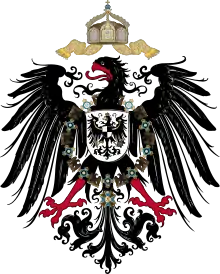Civil Order of Saxony
The Civil Order of Saxony, also known as the Saxon Order of Merit, was established on 7 June 1815 by King Frederick Augustus I of Saxony. It was a general order of merit for the royal subjects of the Kingdom of Saxony for distinguished civic service and virtue.
| Civil Order of Saxony Zivilverdienstorden | |
|---|---|
 Star and grand cross of the order | |
| Type | Civil Order of Merit |
| Awarded for | service to the state for civil virtue |
| Presented by | |
| Eligibility | Saxon civilians |
| Status | Obsolete |
| Established | 7 June 1815 |
| Last awarded | 1918 |
Ribbon of the order | |
| Precedence | |
| Next (higher) | Albert Order |
| Next (lower) | Order of Sidonia |
Classes of the order
_Prinz_Emil_von_Hessen_und_bei_Rhein.jpg.webp)
Prince Emil von Hessen und bei Rhein, Knight Grand Cross
Upon its founding in 1815, the order was divided into seven classes of merit:
- Knight Grand Cross
- Commander First Class
- Commander Second Class
- Knight
- Small Cross
- Gold Civil Medal
- Silver Civil Medal
With an amendment of 18 March 1858, the Small Cross became the Cross of Honour, eventually becoming Knight Second Class on 31 January 1876. The decree also replaced the gold and silver medals with civilian crosses of distinction, in gold and silver. The classes of the order thus became:
- Knight Grand Cross
- Commander First Class
- Commander Second Class
- Knight First Class
- Knight Second Class
- Golden Civil Cross
- Silver Civil Cross
References
- This article is a translation in part from the same article on the Italian Wikipedia
This article is issued from Wikipedia. The text is licensed under Creative Commons - Attribution - Sharealike. Additional terms may apply for the media files.
